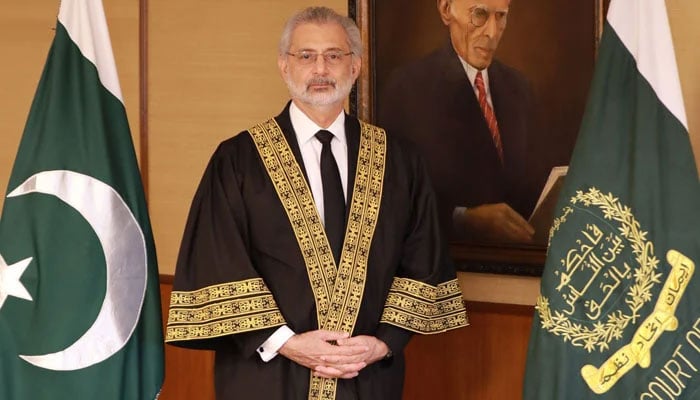The chief justice reconstituted the committee after Justice Sardar Tariq Masood  Chief Justice of Pakistan Qazi Faez Isa. — SC website/File
Chief Justice of Pakistan Qazi Faez Isa. — SC website/File
ISLAMABAD: Chief Justice of Pakistan Qazi Faez Isa has reconstituted a committee mandated for forming SC benches to hear and dispose of appeals and cases registered under Article 184(3) of the Constitution.
According to an office order issued by Jazeela Aslam, Registrar of the Supreme Court of Pakistan, Justice Isa in continuation of the apex court’s office order dated January 12, 2024 has reconstituted the Requisite Committee under Section 2 of the Supreme Court (Practice and Procedure) Act 2023. The committee will now be comprise Justice Isa, Justice Syed Mansoor Ali Shah and Justice Munib Akhtar. The chief justice reconstituted the committee after Justice Sardar Tariq Masood, senior most SC judge, laid his robe on March 10, after reaching the age of superannuation. Currently, after the retirement of Justice Masood, Justice Syed Mansoor Ali Shah and Justice Munib Akhtar are the senior most judges of the apex court after Justice Isa.
It is pertinent to mention here that last year in March, the then coalition government of 13 political parties (PDM) enacted the law, Supreme Court (Practice and Procedure ) Act 2023, after clipping the powers of the chief justice of Pakistan regarding suo motu cases and constitution of benches.
Minister for Law and Justice Azam Nazeer Tarar had introduced The Supreme Court (Practice and Procedure) Bill 2023 in the Senate, a day after it was passed by the National Assembly. Senators from former prime minister Imran Khan’s Pakistan Tehreek-e-Insaf (PTI) had opposed the bill in the Senate, saying that it was in violation of the Constitution as matters related to the Supreme Court could be dealt with amendments to the Constitution through a one-third majority.
The Section 2 of the Supreme Court (Practice and Procedure) Act 2023 relates to constitution of benches of the Supreme Court, which states that every cause, matter or appeal before the apex court would be heard and disposed of by a bench constituted by a committee comprising the chief justice and two senior most SC judges. It says the decisions of the committee would be taken by a majority.
Regarding exercising the apex court’s original jurisdiction, called suo motu powers, the bill said any matter invoking the use of Article 184(3) would first be placed before the committee. “If the committee is of the view that a question of public importance with reference to enforcement of any of the fundamental rights conferred by Chapter I of Part II of the Constitution is involved, it shall constitute a bench comprising no less than three judges of the Supreme Court of Pakistan that may also include the committee members, for adjudication of the matter,” the bill reads. Before the enactment of this law, only the chief justice of Pakistan was empowered to take decisions while exercising suo motu powers under Article 184(3) of the Constitution.











